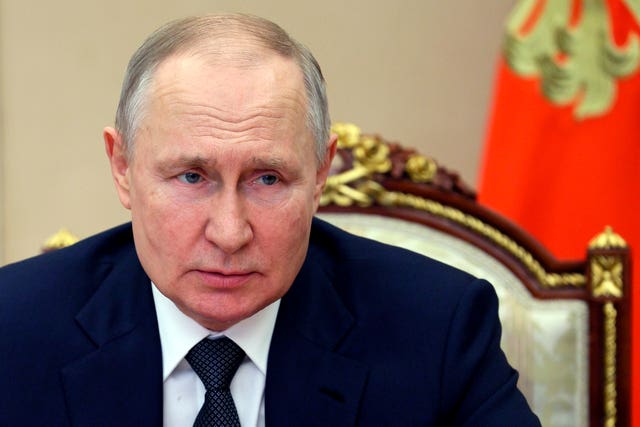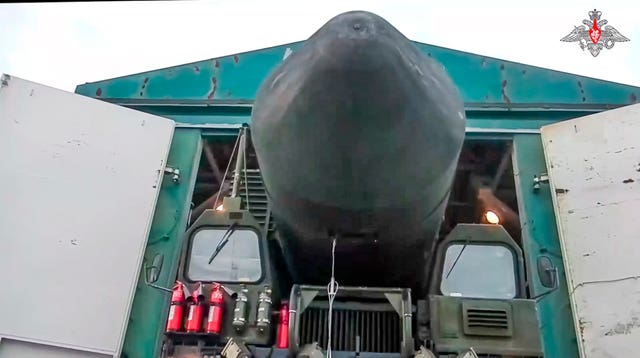Russia stops sharing nuclear forces information with US
Russian deputy foreign minister Sergei Ryabkov said Moscow had halted all information exchanges with Washington.

A senior Russian diplomat said that Moscow would no longer inform the US about its missile tests, an announcement that came as the Russian military deployed mobile launchers in Siberia in a show of the country’s nuclear capability amid the fighting in Ukraine.
Russian deputy foreign minister Sergei Ryabkov said in remarks carried by Russian news agencies that Moscow had halted all information exchanges with Washington after previously suspending its participation in the last remaining nuclear arms pact with the US.
Along with the data about the current state of the countries’ nuclear forces, the parties have also exchanged advance warnings about test launches.
Such notices have been an essential element of strategic stability for decades, allowing Russia and the US to correctly interpret each other’s moves and make sure that neither country mistakes a test launch for a missile attack.

Last month, Mr Putin suspended the New START treaty, saying Russia could not accept US inspections of its nuclear sites under the agreement at a time when Washington and its Nato allies had openly declared Russia’s defeat in Ukraine as their goal.
Moscow emphasised that it was not withdrawing from the pact altogether and would continue to respect the caps on nuclear weapons.
The Russian foreign ministry initially said Moscow would keep notifying the US about planned test launches of its ballistic missiles, but Mr Ryabkov’s statement reflected a change of course.
“There will be no notifications at all,” Mr Ryabkov said when asked if Moscow would also stop issuing notices about planned missile tests.
“All notifications, all kinds of notifications, all activities under the treaty will be suspended and will not be conducted regardless of what position the US may take.”

The movements would involve measures to conceal the deployment from foreign intelligence assets, the ministry added.
The defence ministry did not mention plans for any practice launches.
The Yars is a nuclear-tipped intercontinental ballistic missile with a range of over 6,800 miles (about 11,000km). It forms the backbone of Russia’s strategic missile forces.
The defence ministry released a video showing trucks carrying the missiles driving out from a base to go on patrol. The manoeuvres involve about 300 vehicles and 3,000 troops in eastern Siberia, according to the ministry.
The exercise was taking place days after Mr Putin announced a plan to deploy tactical nuclear weapons to Belarus, Russia’s neighbour and ally.
Tactical nuclear weapons are intended for use on the battlefield and have a relatively short range and a much lower yield compared to the long-range strategic missiles fitted with nuclear warheads that are capable of obliterating whole cities.
Mr Ryabkov said on Wednesday that Mr Putin’s move followed the failure by the West to heed previous “serious signals” from Moscow because of what he described as the “fundamental irresponsibility of western elites before their people and international security”.
“Now they will have to deal with changing realities,” he said, adding: “We hope that Nato officials will adequately assess the seriousness of the situation.”
Russian officials have issued a barrage of hawkish statements since their troops entered Ukraine, warning that the continuing western support for Ukraine raised the threat of a nuclear conflict.
In remarks published on Tuesday, Nikolai Patrushev, the secretary of Russia’s security council, which Mr Putin chairs, warned the United States and its allies against harbouring hopes for Russia’s defeat in Ukraine.
Mr Patrushev alleged that some American politicians believed the US could launch a preventative missile strike on Russia to which Moscow would be unable to respond, a purported belief that he described as “short-sighted stupidity, which is very dangerous”.
“Russia is patient and isn’t trying to scare anyone with its military superiority, but it has unique modern weapons capable of destroying any adversary, including the United States, in case of a threat to its existence,” Mr Patrushev said.





